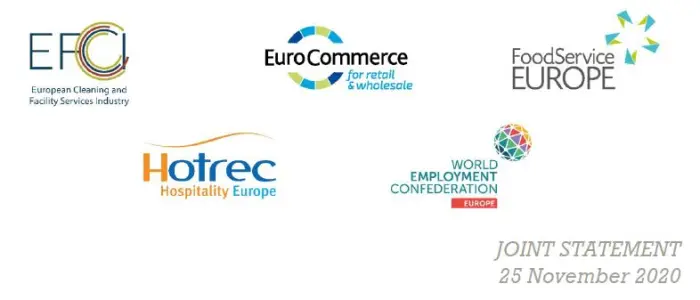Diverse and adaptable forms of work are essential to Europe’s recovery
Diverse and adaptable forms of work are essential to Europe’s recovery
Diverse forms of work: fostering employment, economic resilience and work-life balance in Europe
Background
The Covid-19 crisis is having an enormous impact on our sectors, who are important for job creation and growth in Europe. Part-time, fixed-term work and temporary agency work meet both the needs of employees who have other commitments either in domestic or educational contexts, and the need for labour-intensive services sectors to serve customers predominantly outside regular office hours, and peak periods of demand around holiday and sales periods. Together with full-time work, the diverse and adaptable forms of work in our sectors underpin Europe's social market economy, provide jobs to many women, young and people with disabilities, and are necessary for Europe’s recovery.
Jobs that adapt to the changing realities of our societies
The diversity of work arrangements in our sectors – labour-intensive sectors often providing person-to-person services such as hospitality, retail, cleaning, etc. – allow companies to offer benefits to societies and employees that traditional full-time jobs cannot:
- Strengthening social cohesion through better work-life balance: adaptable forms of work offers the opportunity to ensure a stable income and pursue a professional career for parents and caretakers that otherwise would need to leave the labour market to take care of their dependents and relatives. Our sectors can offer working arrangements tailored to these needs, contributing significantly towards increased social cohesion and stronger communities across Europe.
- Supporting career choices: employees’ preferences in the new world of work are rapidly changing. Some employees are attracted to diverse forms of work because they can more easily combine their part-time job with self-employment, or part-time work elsewhere. Others simply prefer a job that revolves around customer excellence or working with people (e.g. hotels, restaurants, shops). Furthermore, a considerable segment of workers in our sectors are young people often combining work with studies for supplemental income or to help pay for their tertiary education.
- Fostering social inclusion: part-time or temporary jobs can be tailored to the needs of workers with a disability, for previously unemployed people and refugees. When a full-time job is too demanding, part-time and temporary working arrangements may better suit persons with special needs or limited capabilities. In addition, very often our sectors are the main opportunity-generators for people with disabilities to enter the labour market. Flexible working time arrangements also offer the possibility for these persons to gradually integrate in the labour market while allowing enough time to follow training, support, and therapy programmes.
- Enabling personal choice: as the developed economies of Europe have grown richer, flexibility in terms of hours worked is increasingly valued by employees, who often do not need to work full-time to make ends meet. Fixed-term contracts allow some, often young, workers to choose a different lifestyle than was possible in the traditional economy.
Jobs that grant access to social protection and training
Working under diverse and adaptable forms of work also means granted worker’s rights:
- Access to social protection such as pensions and unemployment benefits: in most Member States employees receive social protection even if the contract is part-time (tax-based schemes). Where national law and practice have arranged otherwise (insurance-based countries), employees have the possibility to “opt in” to social security coverage.
- Access to training, employers have the same training obligations and needs for part-time jobs as for full-time open-ended contracts. In fact, a large part of the EU population lacks basic digital skills1, even though most jobs require such skills. As our sectors undergo strong digitalisation processes and adapt to the green economy, training needs arise equally for all types of contracts. Our sectors therefore offer full access to training (e.g. digital, green, interpersonal skills) to part-time employees that otherwise would lag behind and could eventually be left out of the labour market.
A new approach towards diverse and adaptable forms of work is necessary
The world of work is rapidly changing. Societal changes have altered our attitudes and expectations towards work and have put an emphasis on autonomy at work and personal choice. Failing to adapt to these changes will undermine the Union’s competitiveness and enhance the effects of the pandemic.
Our sectors therefore call on the European Commission to adopt pro-active actions by:
- Recognising the contribution of diverse forms of work to dynamic and inclusive labour markets by lowering the administrative burden on companies, in particular SMEs, and facilitating the quick adaptation to workforce needs.
- Promoting diverse forms of work as a steppingstone for individuals into the labour market that opens future career pathways.
- Ensure social protection in all forms of work or safeguard the necessary means to access it, by guaranteeing that all workers play their role in all labour markets, ensuring the adaptability of economies and protecting and integrating workers.
- Ensure that all forms of work are protected by national short-time work schemes, granting full employment protection to all sectors.
- Help up-skill and reskill the workforce via the different EU funding opportunities and make sure that workers are ready to face the challenges of the digital age and willing to adopt more sustainable behaviours. With the new multi-annual financial framework being put in place and the NextGenerationEU Recovery Fund, equal access to EU funding for all forms of work should be ensured.
- Promote Social Dialogue by fully including diverse and adaptable forms of work in collective bargaining.
We look forward to working with European decision-makers to build on a shared understanding of the real economic and social contributions made every day by the 7.8 million2 European companies in our labour-intensive sectors serving 450 million Europeans.
ENDS
Contacts:
EFCI: Sergi Queralt - [email protected] | EuroCommerce: Neil McMillan – [email protected] | FoodServiceEurope: Cristina Freitas - [email protected] | HOTREC: Marta Machado - [email protected] | World Employment Confederation-Europe: Michael Freytag - [email protected] |
